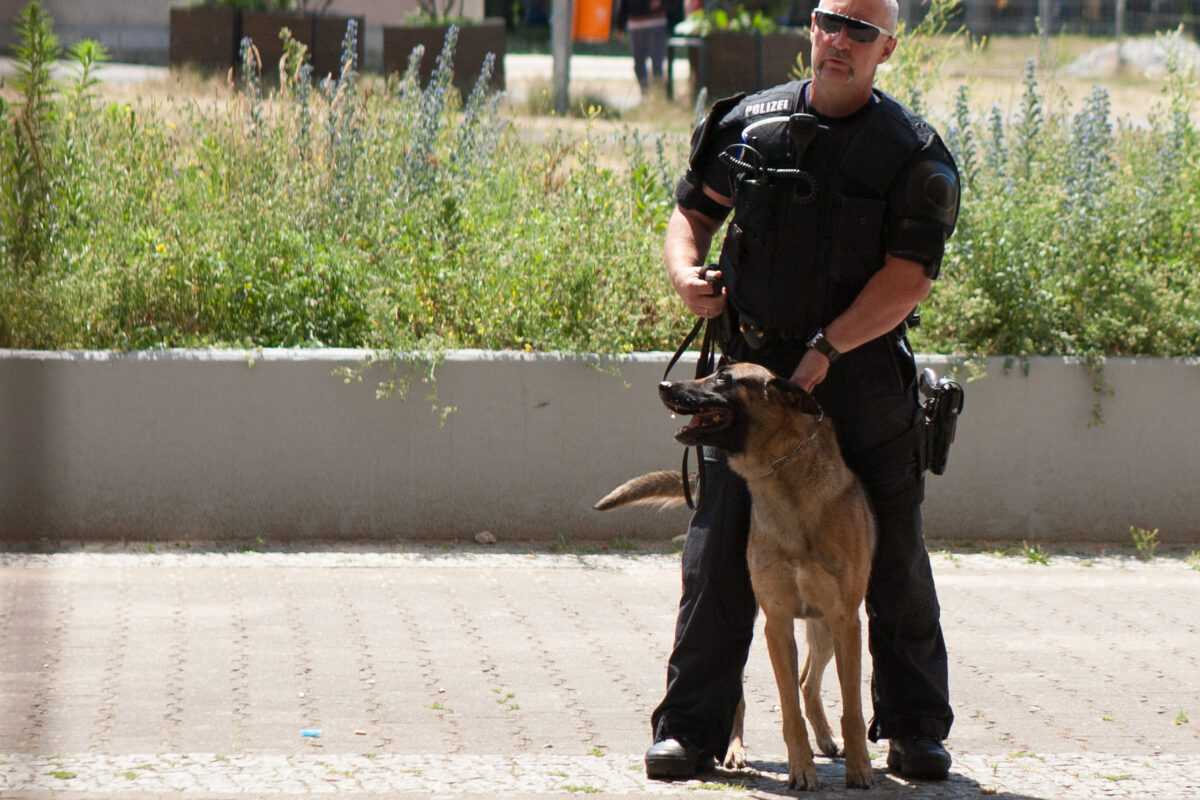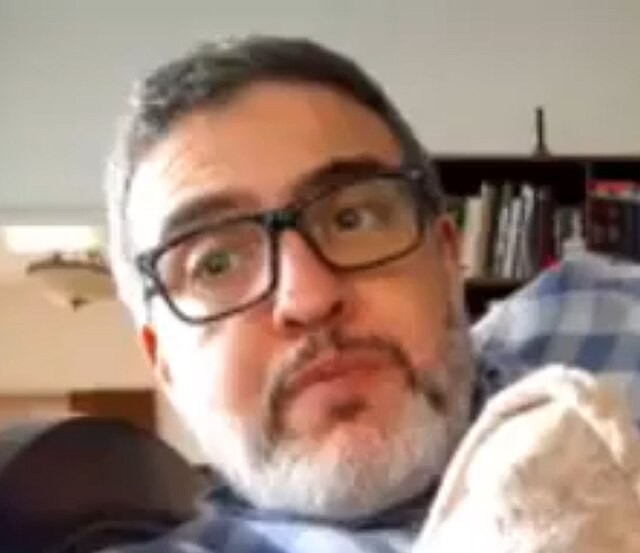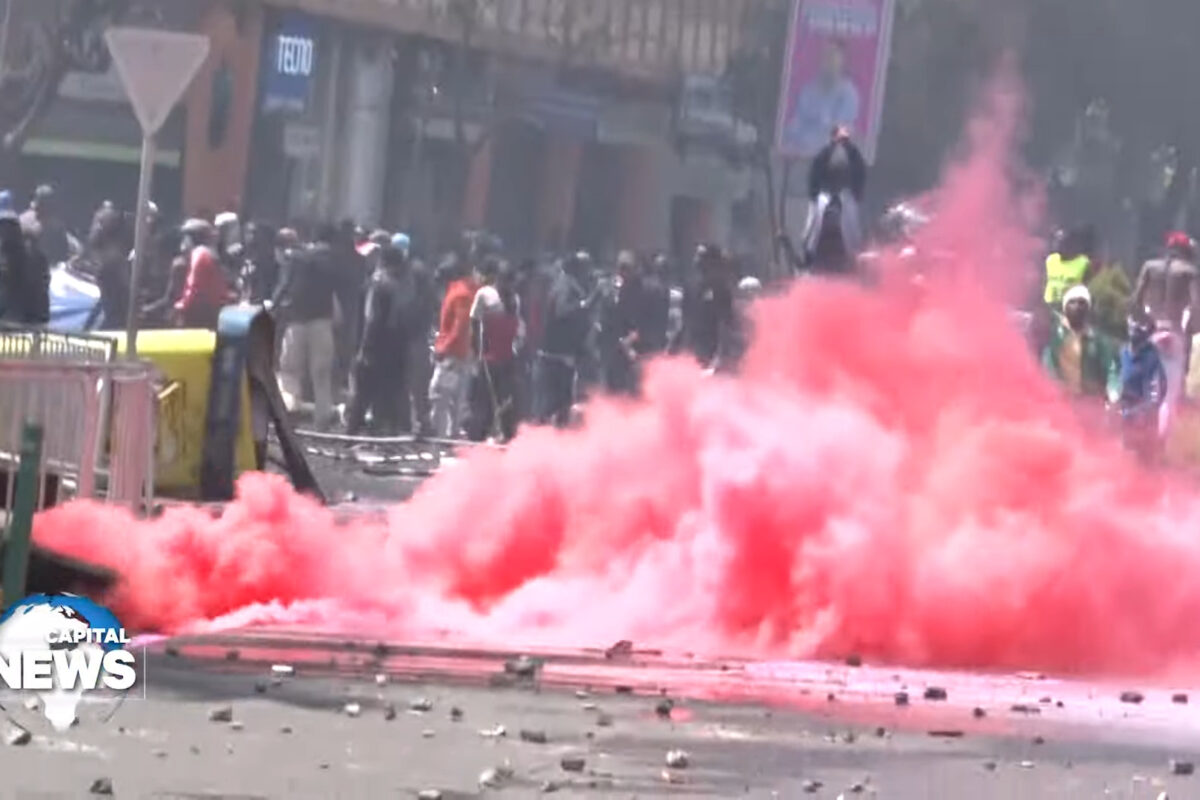Over the past twenty months in Berlin, human rights demonstrators have been routinely brutalized, their events cancelled or severely curtailed, their speech banned.
The list is well-known: the court order that the 2025 Nakba Day protest stay in one place; the cancellation of events with Francesca Albanese; the “Palestine Congress”; the violent dissolution of a protest camp at the Freie Universität Berlin; the eviction of students at the Humboldt University at the behest of the mayor; instances of police violence at numerous demonstrations; the Fördergeld affair; and the criminalization of some speech in support of Palestinians’ human rights.
A comparison with the neo-Nazi demonstrations honoring Adolf Hitler’s deputy Rudolf Hess in 2017 and 2018 as well as the repeated display of mock Judenstern patches at pandemic denier assemblies illustrates the Berlin authorities’ inconsistencies in banning protests as well as in enforcing laws against racist and antisemitic incitement and insulting the dignity of victims of Nazism.
Most blatant has been the inconsistent adherence to the Federal Constitutional Court’s own principle that if multiple interpretations of a statement are conceivable, then legal assessment must be based upon the interpretation most favorable to the speaker. This principle has been confirmed in many rulings.
The discrepancy reveals a double standard: Neo-Nazi demonstrations are protected under the principle that permitting universally condemned speech proves the state’s commitment to upholding the right to free speech, while the broad coalition of those protesting the Gaza genocide have had their rights repeatedly violated in the name of Staatsräson.
German police forces are allowed to ban assemblies if they determine that the event poses a threat to public safety or that laws are likely to be broken. The decision is often grounded in the police’s assessment that the event’s participants will break the law against racist incitement (Volksverhetzung), which bans racist statements as well as other statements and actions that attack the human dignity of others. The law against incitement specifically bans denigrating the victims of Nazism. The law that enables police to ban events, often referred to as Gefahrenprognose (risk assessment), also specifically mentions demonstrations that might denigrate the dignity of the victims of National Socialism.
Yet on August 19, 2017, neo-Nazis organized a march in Berlin to honor Hitler’s deputy Rudolf Hess. They registered the event in Spandau, not far from the site of the Allied prison for war criminals where Hess died by suicide on August 17, 1987. Berlin’s interior minister at the time, Andreas Geisel, stated that: “I would have liked to ban [the demonstration], and we carefully looked into doing so, but we concluded that assholes also have constitutionally protected democratic freedoms.” Although they were not allowed to “glorify” Rudolf Hess during the demonstration, the neo-Nazis carried a large banner with a quote from a statement Hess made at the Nuremberg Trials: “Ich bereue nichts” (I regret nothing). Beneath the quote stood the words “Nationale Sozialisten Berlin.” A thousand police officers from Berlin and around Germany protected the march. Many people successfully organized to block the route, forcing the neo-Nazis to return to a square near the Spandau train station.
In a parliamentary inquiry after the event, representatives from Die Linke asked the Berlin Interior Ministry why they did not view the banner as “glorifying” Hess. The Interior Ministry responded that the police department’s lawyers present at the event determined that the banner was not in violation of the laws against incitement. The representatives also asked why the march was not banned for potentially violating laws against denigrating the victims of National Socialism. The Interior Ministry responded that the march could only be forbidden if there was a high likelihood that participants would violate these laws, which the police did not consider to be the case.
In August 2018, neo-Nazis again organized a “Hess March,” and Andreas Geisel again regretted that there was nothing he could do. In fact the Federal Constitutional Court’s 2009 approval of a ban of a demonstration honoring Hess at his grave in Wunsiedel created judicial precedent. But the Berlin Interior Ministry stated that they could not conclude that the 2018 march was primarily focused on honoring Hess as a symbol of Nazism, because the official registration for the demonstration stated it sought to propagate the conspiracy theory that Hess was murdered.
For the 2018 march, the neo-Nazis devised a strategy to avoid the previous year’s outcome. They registered identical demonstrations in Spandau and in Friedrichshain to create uncertainty about where the demonstration would actually occur. A small group appeared in Spandau—including a known Holocaust denier apparently driven there by the police—while the majority went to Friedrichshain. The police protected them as they walked from Alexanderplatz to the Platz der Vereinten Nationen. One man showed up with a Hitler-like mustache and haircut. Some people reported that neo-Nazis shouted racist and antisemitic insults at bystanders along their route. The Jewish Forum published a video of neo-Nazis making antisemitic statements and performing Nazi salutes. The neo-Nazis were even permitted to carry flags of the German Empire, a known substitute for the swastika flag. Despite the ban on wearing uniforms, they all wore the same dress—white button-up shirts and black pants. Again, when representatives in the Abgeordnetenhaus asked Berlin’s government about this, its officials demurred.
In 2018, the 2,300 police officers—more than double the number of 2017—were better prepared to force the march through Friedrichshain to its endpoint in neighboring Lichtenberg. They physically removed people who attempted to block it from proceeding. Responding to the attempts to block the march and to alleged instances of people throwing glass bottles at the neo-Nazis, the official Berlin Police account tweeted: “Our officers protect every assembly against disruptions, regardless of its topic. This guarantees the basic right to freedom of assembly.”
Although they were still not allowed to “glorify” Rudolf Hess, the neo-Nazis again carried the banner reading “Ich bereue nichts.” In a parliamentary inquiry, the same three Linke representatives again asked the Interior Ministry why the banner did not qualify as “glorifying” Hess. The administration responded that, read within the totality of circumstances, the statement did not violate laws against incitement. The reason was that, following the aforementioned principle laid down by Germany’s constitutional court, it can be interpreted in numerous ways. This is despite the fact that the police stated they were aware that the full quote from Hess reads: “I am happy to know that I did my duty towards my people—my duty as a German, as a National Socialist, as a faithful follower of the Führer. I regret nothing!” The full context of the statement and the refusal to cancel the march because of it demonstrates the extreme degree to which the Berlin Police’s lawyers wanted to adhere to the principle of interpreting speech in a way most favorable to the speaker.
During the Covid-19 pandemic, anti-vaccine critics of Germany’s public health measures held numerous rallies in Berlin. Beginning with the earliest demonstrations in May 2020, demonstrators regularly wore mock Judenstern patches with the word “Jude” replaced with “ungeimpft” (unvaccinated). This act of Holocaust relativization repeatedly occurred at the demonstrations up through 2022. Opinions on whether it broke the laws on incitement and denigrating the victims of Nazism diverged in a Germany-wide debate. Only in 2022 did the Berlin Police direct officers to cite people for wearing the mock Judenstern. Although the Berlin Police did try to ban some of the pandemic denier demonstrations, they did so on the grounds that participants had repeatedly violated the emergency public health laws in effect at the time, not because participants had minimized Nazi crimes and disrespected their victims.
The authorities’ willingness to point to multiple possible interpretations when reading a statement clearly intended to glorify Rudolf Hess and to tolerate mockeries of the Judenstern stands in stark contrast to the sensitivity towards speech and events in support of Palestinians’ right to exist. While a statement’s multiple meanings was called upon in 2018 to allow the public display of a statement made by a Nazi criminal that clearly glorifies National Socialism, the police used force to break up a protest encampment at the Freie Universität shortly after it began because the university’s president believed “this kind of protest is not dialogue oriented.” The Berlin Police have banned the Arabic language at demonstrations. They showed up in numbers at Albanese’s event to surveil her speech. A woman was convicted for a protest chant that the judge claimed “could only be understood as a denial of Israel’s right to exist and an endorsement of the attack,” despite different German courts asserting that the chant has multiple interpretations and thus cannot be per se banned. These cases indicate that the Federal Constitutional Court’s presumption in favor of expression is inconsistently applied in Berlin.
Other aspects of the forgiving treatment of neo-Nazis also stand in contrast to the treatment of speech in support of Palestinians’ rights. While police helped the 2018 Hess March reach its planned destination, demonstrators against the Gaza genocide have faced significant police brutality. While pandemic deniers clearly relativized the Holocaust (a form of Holocaust denial) by comparing it with pandemic health measures, the Palestine Conference was ultimately cancelled because police feared that speakers would make antisemitic statements or statements that “glorify violence or deny the Holocaust” (though no such statements had been made), a decision that Berlin’s interior minister, Iris Spranger, defended. While Andreas Geisel regretted that the German constitution forbade him from banning the Hess Marches, mayor Kai Wegner demanded that the FU Berlin cancel an event with Francesca Albanese.
The Berlin authorities’ inconsistent application of laws and restrictions on assembly between the pro-Palestine demonstrations, on the one hand, and the neo-Nazi and pandemic denier demonstrations, on the other, is remarkable.
The Berlin Police and the Berlin state government hesitated to prosecute explicit instances of antisemitism and Holocaust denial in the form of glorifications of Rudolf Hess and mockery of the Judenstern. But they have elected to ban or call for the ban of events protesting the genocide against Palestinians in Gaza—at least some of which have been co-organized by coalitions that include Jewish groups—out of fear that antisemitic statements might be made.
The rise of antisemitic crimes since the Hamas massacre of October 7, 2023 as well as acts of antisemitism at pro-Palestine demonstrations are unacceptable and have rightfully been condemned. Unacceptable, too, is the rise of antisemitic crimes that has been recorded in Germany since 2018, which have primarily been committed by right-wing extremists.
But when it comes to banning events based on their potential for harboring antisemitic speech, the history outlined above illustrates that Berlin authorities follow a double standard. While they have been willing to extend significant latitude to right-wing extremists and ethnic German pandemic deniers, events featuring speech in support of Palestinians’ rights have been cancelled or brutalized. The discrepancy leaves Berlin’s government open to criticism that the ban of some pro-Palestinian events represents an instance of German authorities’ focusing on migrant groups’ alleged antisemitism while ignoring ethnic German antisemitism and racism.
Esra Özyürek’s analysis of the “export-import theory of Muslim antisemitism in Germany” in her book Subcontractors of Guilt helps situate the discrepancy in a broader historical context. In her research on educational programs to fight antisemitism among migrant youth, Özyürek cites a program funded by the Federal Ministry of Family Affairs that drew a distinction between “historical” antisemitism and “contemporary” antisemitism. While German youth were seen to be “prone to ‘historical’ antisemitism,” “Muslim migrants are seen to be predisposed to ‘contemporary’ antisemitism” (79). “Bewilderingly,” Özyürek notes, “temporalizing the antisemitism of right-wing non-immigrant residents of Germany as ‘historical’ meant that the antisemitic and anti-immigrant crimes carried out by this group in Germany at the time were suddenly deemed anachronistic and outmoded historical errors.” Meanwhile, “temporalizing antisemitism among immigrants as ‘contemporary’ made them the primary and most present and future danger” (79–80). The distinction is rooted in the larger project of holding immigrants responsible for having “imported antisemitism to the continent,” which “successfully obscures non-immigrant European and German antisemitism” (101). It “offloads the general German social problem of antisemitism onto the Middle Eastern–background minority and further stigmatizes them as the most unrepentant antisemites who need additional education and disciplining” (3).
The logic of “historical” versus “contemporary” antisemitism and the stigmatization of immigrants in general, and Palestinians and their supporters in particular, continues to find expression in Berlin today. While neo-Nazis are written off as a few bad apples, speech promoting Palestinian rights and criticizing Israel’s conduct in Gaza is viewed as a systemic issue. The consequences are deleterious. As respected jurists have noted, the crackdown on speech for Palestinian rights has hollowed out constitutional rights and international law more generally. The history detailed here shows that the double standard critiqued by Özyürek continues to find expression in Berlin today.




